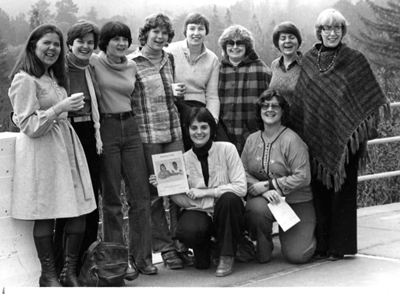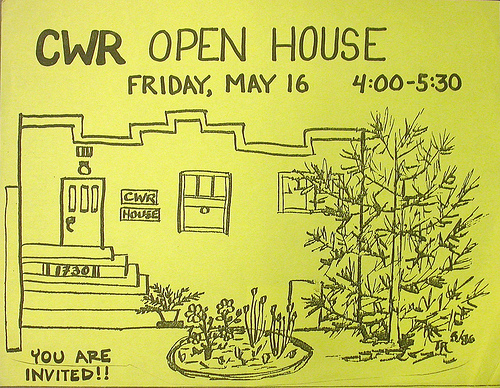 |
||
| From left, CWR Directors, Mary Cross and Barbara Waugh, Diane Darling, unidentified, Jean Richardson, Kathleen Smith, Diann Neu, and Joanne Eakin. Front, Christine Lesley and Anne Stinely. 1979-80. |
Center for Women and Religion at the GTU was the earliest established center for women in theological education. It was founded in 1970 as the Office of Women's Affairs by Bay Area women in religion, including some GTU women, who recognized "that seminary women at the GTU schools needed a channel, an advocate, an office through which to express their needs and concerns." It operated originally out of Unitas, the campus ministry program at UC Berkeley. Soon, OWA became affiliated with the GTU.
In 1977, the name was changed to the Center for Women and Religion. For a short period, both names were used for various events and functions. After affiliation with GTU, OWA/CWR had an office at the 2465 LeConte Building, expanding later to an office in the GTU Annex at 2452 Virginia and the CWR House at 1730 Scenic.
CWR’s mission was in the areas of research, the status of women in religious structures, and community building for women students, faculty, staff, and spouses moving to the goal of ending sexism and promoting justice in and through religion. It worked to accomplish these goals through the distribution of resources, offering GTU courses, and through various sponsored conferences, programs, events, and groups. Early publications include Women and the Word: Toward a Whole Theology, an anthology of women's writings, and Women in a Strange Land: Search for a New Image, a collection of writings about women's experiences of isolation during the period of early feminist theological scholarship.
 |
CWR published a newsletter starting in 1975. While continuing the Newsletter, the Center also began publishing the Journal of Women and Religion in 1981, ceasing publication with Vol. 19-20 in 2002. The Feminist Curriculum Project functioned 1983-2002. Grants generated income for a Curriculum Coordinator who coordinated CWR sponsored courses in the Graduate Theological Union. The repeated courses were usually Feminist Theology, Feminist Issues, or Feminist Ethics. Individual or one-time courses on various issues were offered over the years.
The leadership of the Center evolved over the years. This was due to changing concepts of how functions and staffing were understood and a model of shared work practiced. The early years divided work non-hierarchically. From 1978, the Co-Directors were Barbara Waugh and Mary Cross with Sandra Park, Associate Director, 1980-84; 1986-89, Co-Directors Mary Cross, Margaret McManus, and Sandra Yarlott; 1989-93, Pamela Cooper-White, Director; 1994-96, Marta Vides, Interim Director; and 1997-2004, Cheryl Kirk-Duggan, Director.
CWR continued its mission and program sponsoring conferences, programs, events, and groups into the beginning of the 21st Century. In 2000, the mission was stated as promoting “diverse women’s voices in cutting edge theology education for spiritual growth and social change.” The Center for Women and Religion ceased operation in early 2004. There are 32 boxes in the Collection divided into twelve Records Series: 1. Board of Directors Meetings and Minutes, 2. Administrative Records, 3. Financial Records, 4. Development Records, 5. Programs, Projects, and Events (including the Feminist Curriculum Project), 6. Newsletters and Journals, 7. Women’s Resources, 8. Photographs, 9. Negatives, 10. Slides, 11. Audiocassettes, and 12. Videocassettes.
“Our context as a Center for Women and Religion in the midst of nine traditional theological institutions gives us a unique opportunity to see the effects of women’s exclusion from theological culture. We see how the exclusion of women from leadership and theological education results in the elimination of women as shapers of official theological culture . . . Because feminist theology does not control the definition of the tradition it has not had any power to determine what will be read and remembered by the next generation of theology students. So, we continue to lose our own history and we have to begin again and again as though our questions had never been asked or answered before.” – Sandra Yarlott, CWR Director, 1986.
Lucinda Glenn Rand, Archivist, wrote this article for the GTU Dean's Letter, May 2006
For further information or to research the CWR Collection, see the Finding Aid or email GTU Archives.
